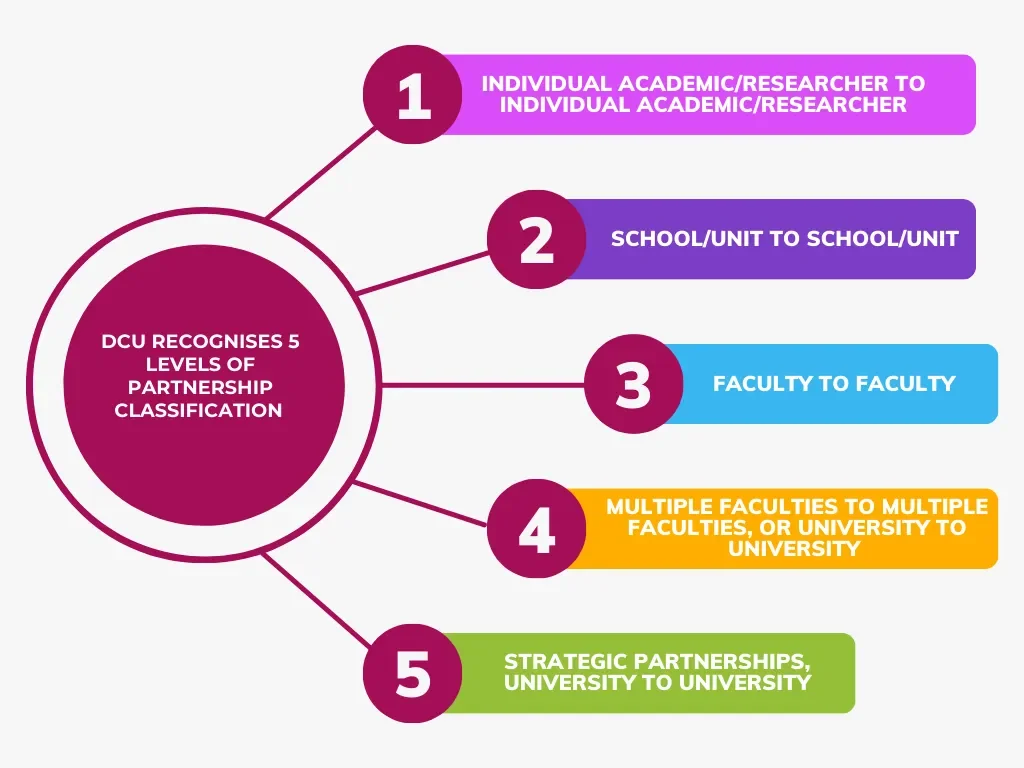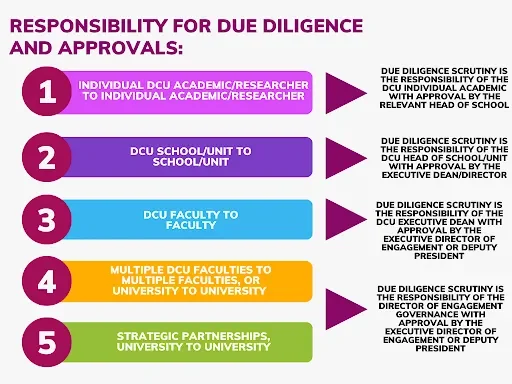
International Partner Approval Process
Introduction
International Partnership can be defined as an ongoing collaborative relationship with an international university or HEI, built around a shared purpose and combining complementary expertise and resources to deliver mutual organisational benefit and impact.
DCU collaborates with an impressive network of international partners that align with the University’s Mission and Strategy and promotes DCU’s reputation for excellence in research and education, delivering impact at home and abroad. Through partnerships across the globe, DCU provides opportunities for:
- collaborative research and peer reviewed publications
- student and staff mobility
- collaborative academic provision
- innovative curriculum development
- student recruitment
- enhanced cultural diversity and richness
Partnerships entered into by the University must be established in line with the International Partner Approval Process (IPAP) and reflect DCU’s Principles of International Partnership. IPAP applies to all staff involved in developing a new, or considering the renewal of an existing, international partnership. It addresses the steps required, including due diligence, before a partnership can be endorsed and approved at the appropriate level within the university.
IPAP complements, but is distinct from, DCU’s approved procedures for entering into Academic Collaborative Provision, Collaborative Research and Exchange/Mobility agreements.
ACADEMIC COLLABORATIVE PROVISION: Information and guidance in relation to HE agreements, leading to academic awards, credits or qualifications, is available on the OVPAA website. Visit Policy on Collaborative Provision and Collaborative Provision protocols. Information and guidance in relation to HE agreements on Research Supervision and Collaborative Awards can be found on the GSO website.
COLLABORATIVE RESEARCH: Information and guidance on DCU’s Collaborative Research processes and procedures and the support available can be found on RIS website.
EXCHANGE - MOBILITY: Information and guidance on student and staff mobility programmes and DCU partners is available from the Placements Office.
The International Partner Approval Process:
- Helps expedite the process of entering into partnership agreements, from initiation to execution, especially where there are existing agreements in place
- Provides direction in respect of appropriate levels of Due Diligence for new partners
- Provides agreement templates, where appropriate, and related supports
- Outlines steps required to foster and protect the proposed partnership
Proposals for new partners must be initiated in consultation with the relevant Head of School and Faculty Dean, and include early consultation with the Office of the Executive Director of Engagement (OEDE).
Depending on the specific nature of the partnership, the Office of the Vice President for Academic Affairs, Office of the Vice President for Research and the Placements Office should also be consulted.
The exact steps to partnership approval will depend on the purpose, scale and specific considerations, including any risk factors, associated with the proposed partnership. A partnership agreement in respect of a new partner for DCU cannot be entered into without reasonable due diligence scrutiny in accordance with the University’s Due Diligence Guidelines.
All partnerships must be in alignment with DCU Principles of International Partnership
For advice and information regarding entering into, or advancing, a partnership, contact: Global Partnerships, OEDE
For advice and information regarding MOUs, due diligence and to query existing partnership status, contact: Engagement Governance Unit, OEDE

5-STEP REVIEW AND APPROVAL OF NEW PARTNERS
- Identify prospective partner and conduct preliminary exploration of opportunity. Check if there is a pre-existing relationship with DCU.
- Conduct Due Diligence scrutiny, as appropriate
- Commitment to proceed and developing a draft agreement
- External negotiation and review
- Approval and signature
Step 1: IDENTIFY POTENTIAL PARTNER; CONDUCT PRELIMINARY EXPLORATION OF OPPORTUNITY
Partnerships may be initiated by an individual/school/faculty/unit within the University (‘DCU proposer’). The approach may also be initiated by an external institution interested in partnership with DCU.
Preliminary considerations, in order to make an informed judgement, must include:
- Is there alignment with DCU’s mission and strategic priorities?
- Is there a pre-existing relationship with the proposed partner?
- If there is an existing relationship, where is it held and what is the nature of its impact for DCU?
- What level of commitment, time and resources, will be required to successfully deliver the partnership?
- What is the nature of the collaborative activity anticipated, between DCU and the proposed partner, arising out of the partnership, if known?
- What are the potential risks if the proposed partnership does not deliver on expectations?
N.B. In instances where partnership and a specific collaborative provision are being considered by DCU and the proposed partner simultaneously the OVPAA must be consulted.
Other important partner considerations include trust, good communications, cultural context, shared goals and conflicting priorities.
The DCU proposer identifying the opportunity must
1. Consult at the outset with their Head of School or Faculty Dean/Director to ensure early stage support, and must liaise with the Office of the Executive Director of Engagement, and as appropriate, the OVPAA, OVPR or Placements Office, to ensure awareness and early engagement in the approval process, and
2. Inform the potential partner, from the outset, that DCU has a formal Partner Approval Process which includes a due diligence assessment. Depending on the nature of the proposed collaboration and/or status of the proposed partner, this may involve a formal visit and scrutiny of financial status. This will be decided by the Executive Director of Engagement, VP Academic Affairs, or VP Research, as appropriate, in consultation with relevant colleagues and offices.
To check if a formal partnership with DCU already exists contact: Engagement Governance Unit, OEDE
Step 2: DUE DILIGENCE
Due Diligence is the process by which the University ensures that a prospective partner institution is deemed to be a valid, reputable and timely partner. All new partner proposals are subject to due diligence appropriate and proportionate to the proposed relationship.
DCU will only consider partners that meet basic business and legal criteria, have a working and learning environment which meets fundamental standards and have a standing consistent with an ability to partner. In validating partners, DCU must ensure that there are no easily identifiable risks - financial, legal, reputational and strategic - to engaging collaboratively with another institution. A prospective new partnership must not be progressed without the appropriate level of due diligence scrutiny.
DCU's Due Diligence responsibility and approvals are summarised below. Please refer to the Due Diligence Information Sheet for further details.

To verify existing active partnerships and / or for advice on the process and the appropriate level of due diligence required, Contact the Engagement Governance Unit, OEDE.
Step 3: COMMITMENT TO PROCEED AND DEVELOPING A DRAFT AGREEMENT
Following successful completion of steps 1 and 2, and a commitment with appropriate approvals to proceed, the next step involves preparing a draft agreement. Most international partnerships entered into by the University will start with an MOU or a Letter of Intent.
The Memorandum of Understanding (MOU) provides a general framework for agreement on future cooperation between two, or more, parties. It may broadly describe the type of collaboration to be explored, but does not commit to any specific outcome and does not commit resources. It is not a legal commitment and is not legally binding.
The Letter of Intent (LoI) is a general statement of intent to explore possible future collaborations. It contains no legal obligations.
Where there are no substantial revisions required, the DCU template MOU may be considered ‘as is’ with only the addition of specific details, such as name and contact details, effective date and term of the agreement to be included, before sharing with the partnering institution for their consideration (step 4 below).
Where changes are required to the University’s template MOU, or where the template is not appropriate in a given situation, the DCU proposer must work with the Director of Engagement Governance and relevant university units to assist with developing a suitable agreement. The draft agreement should not be shared with the external partner until such time as the relevant DCU offices/individuals have had an opportunity to review and give feedback on aspects that pertain to their area.
A copy of the DCU MOU template can be requested from the Engagement Governance Unit, OEDE
Step 4: EXTERNAL NEGOTIATION AND REVIEW
During the Negotiation and Review phase, the DCU proposer and the proposed partner will consider the terms set out in the draft agreement. It is common for some details to change at this stage and it is important to note that any requested amendments to the terms must be brought to the attention of the appropriate DCU office/s, i.e. Head of School or Faculty Dean and, as necessary, the VPAA, VP Research, Partnerships Office and OEDE (Global Partnerships & Engagement Governance) before the agreement is ready for final approval and signature.
Step 5: APPROVAL AND SIGNATURE
The final step, once the parties have approved the terms, is the signing of the agreement, which must be in line with the DCU Signing Authority protocol. Where possible, DCU should request to sign first as this provides an opportunity for final review of the document and its associated internal approvals as necessary.
When parties have signed the agreement it becomes a fully executed agreement and actions covered within the agreement can proceed from the ‘effective date’.
IMPORTANT
|
If you have a question regarding the partner approval and signing protocols, please contact the Engagement Governance Unit, OEDE.
All agreements entered into by DCU must include an expiration date, which typically will be no more than 3-5 years from date of last signature.
Extension of the agreement should be conditional upon a number of factors, including a positive evaluation of the partnership and the outcomes accomplished throughout the initial ‘term’. The evaluation must include input from key stakeholders involved. Where an amendment to an executed agreement is required, the expected outcomes for the agreement renewal period will have to be addressed.
The University does not allow automatic renewal clauses or roll over terms. A request for an extension/renewal of an agreement should be submitted to the appropriate faculty or professional unit at least 6 months prior to the expiration of the existing agreement.
TERMINATION OF PARTNERSHIPS
Arrangements for the termination of a partnership by either party to the agreement must take the duty of care towards any existing commitments, including those towards our students, into account, and where relevant, provide for the undertaking and commitments to continuing students or programmes.
The Engagement Governance Unit, OEDE, is responsible for DCU partnership records data management. Information regarding DCU’s existing international partners can be requested from the Engagement Governance Unit:
Director of Engagement Governance (position vacant)
Engagement Governance Officer, Michael Mullooly - michael.mullooly@dcu.ie
Where possible, it is preferable for DCU’s approved MOU to be the document signed with the proposed partner. Where the proposed MOU wording deviates significantly from the approved DCU template, please contact Engagement Governance for advice. A copy of the DCU MOU template may be obtained from the Engagement Governance Unit, OEDE.
